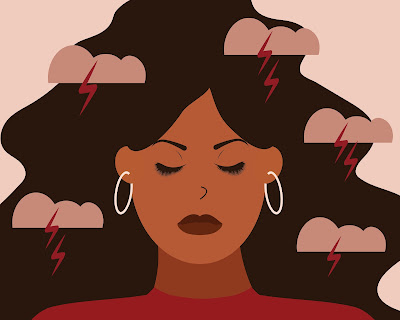In previous articles about early recovery, I addressed problems with making major major adjustments to life to maintain sobriety (see my articles:
Early Recovery: Focusing on the People Part of "People, Places and Things," Overcoming the Temptation to Use "Liquid Courage" to Cope With Social Situations and
Early Recovery: You've Stopped Drinking. Now What?. In this article, I'm addressing another common issue that people in early recovery experience, which is overcoming the feelings of emptiness and loss after you give up your addiction.
 |
| Early Recovery: Overcoming Feelings of Emptiness and Loss |
Many people in early recovery will say that one of the hardest things they had to do in order to get sober was give up the one thing they felt they could rely on--their addiction of choice.
For anyone who is unfamiliar with addiction and early recovery, these feelings of emptiness and loss for an addiction might seem confusing.
But as a psychotherapist in private practice in New York City, who has worked with people at all stages of addiction, I know that this sense of loss and emptiness is common and understandable.
After all, if the addiction, whether it's to alcohol, drugs, compulsive gambling, compulsive sexual behavior or any other addictive behavior, didn't
serve a need, the person with the addiction wouldn't persist in it.
For many people, who are contemplating giving up an addiction, one of the most daunting aspects of attaining sobriety is the thought they won't have what feels to them as a "friend" who has served a need--whatever that need might be.
The need could be a way to relax, socialize, to temporarily forget problems, to elevate a mood, to feel empowered, and so on. And if the addiction of choice didn't "work" in some sense, even temporarily, it would have been given up long before it became an addiction.
For someone who is unfamiliar with addiction, it would be hard to imagine just how scary and how
courageous it is when someone who has an addiction gives it up. Many people, who are not educated about addiction, think that the person with the addiction "should just stop."
But aside from the fact that there might be a
physical danger to "just stopping" for many addictions where a detox is necessary, the person contemplating giving up the addiction is also taking a leap of faith that they will be able to survive physically and
emotionally with the addiction.
This is why there's a high rate of relapse for people struggling to stay sober, especially if they try to do it without sober support and, eventually, working through the underlying emotional problems that led to the addiction in the first place.
What Will Take the Place of the Addiction for the Person in Early Recovery to Fill the Emotional Void?
Without the addiction, the person in early recovery will usually become aware of an emotional void and the sense of loss.
 |
| Early Recovery: Overcoming the Feelings of Emptiness and Loss |
Since isolation and loneliness is often a part of addiction, many people in early recovery find support in 12 Step meetings like
Alcoholics Anonymous or
Gamblers Anonymous.
They discover that there are people in these self help meetings in all different stages of recovery--from early recovery to many years in recovery.
They also discover that they have much in common with the people in these self help rooms, including a continuing struggle to avoid relapse and to maintain the values and principles they learned in those rooms.
I usually recommend that people in early recovery give 12 Step meetings a chance by going to several beginners meetings to see if they find a particular meeting where they feel comfortable and where they can also find a sponsor to help them work the 12 Steps.
There is no one-size-fits-all approach to recovery, so I also understand that for some people in early recovery the 12 Step model doesn't resonate with them or they find the meetings too overwhelming after they've tried several meetings (see my article:
The Early Stage of Recovery: What to Do If 12 Step Meetings Are Too Overwhelming For You?).
So, many people in early recovery prefer to go to structured treatment in either an inpatient or outpatient substance abuse program, if they have health benefits that recovers this treatment, where they can also get group support from people with similar problems.
Other people seek out psychotherapists who have experience working with people in recovery, including early recovery.
For psychotherapy option to work well in early recovery, the psychotherapist needs not only to be familiar with addictions, she must also know how to assess the timing and what the client can tolerate in terms of working on the underlying issues.
It's essential that clients in early recovery have sufficient sober time, the coping skills and necessary internal resources to deal with the underlying emotional issues in therapy, so it's psychotherapists need to help clients to develop these internal resources before delving deeper (see my article:
Developing Internal Resources and Coping Strategies).
All of these modalities--12 Step meetings, structured substance abuse programs, and psychotherapy--all have the potential to help clients to remain sober.
In addition, in many cases what's also needed is something
deeper that will fill the void that's left from no longer engaging in the addiction.
Some people find meaning by discovering or rediscovering a sense of spirituality.
Spirituality doesn't necessarily mean religion, although it could (see my article:
A Search For a Meaningful Life and
Spirituality: Are You Contemplating Your Faith of Origin in a New Light?).
Spirituality can take on
many different forms aside from formal religion. For instance, many people feel a sense of spirituality when they volunteer to help others, including volunteering at 12 Step meetings or in schools or a local community program. Others discover a sense of spirituality in nature and find a connection to nature a
transcendent experience.
The important aspect of spirituality in whatever form it takes is that it is meaningful, fulfilling and transcendent.
I believe this applies to
everyone--not just people in early recovery. Whether you call it "spirituality" or something else, without a sense of
meaning, purpose and transcendence, you're just living from day to day and it can feel empty.
Many people who don't struggling with addiction but who focus only on material things will often feel a sense of emptiness in midlife when money and possessions no longer serve elevate their moods.
Usually, midlife brings an awareness that money and material things, although necessary to a certain extent to meet basic needs and give some comfort, are never enough to fill up a sense of emptiness.
This is why many people in midlife, especially those who have more years behind them than ahead of them, recognize that they need to make changes (see my articles:
Midlife Transitions: Part 1: Reassessing Your Life,
Midlife Transitions - Part 2: Living the Life You Want to Live,
Is That All There Is? When "Having It All" Leaves You Feeling Empty and
Redefining Happiness and Success For Yourself).
Conclusion
The early recovery stage presents certain challenges, including dealing with the sense of emptiness and loss that often occurs after giving up the addiction.
 |
| Early Recovery: Overcoming Feelings of Emptiness and Loss |
Aside from the physical aspects of getting sober and maintain sobriety, people in early recovery need to find healthy and meaningful ways to fill the void.
Sober support from 12 Step meetings, substance abuse programs and psychotherapy offer various options for staying sober and, in the case of psychotherapy, working through the underlying emotional problems that led to the addiction in the first place.
Beyond these options, people in early recovery need to find a sense of meaning and purpose in their lives. I refer to it as "spirituality," but it doesn't have to involve a formal religion or even a belief in a higher power.
Without a sense of meaning and transcendence, people in early recovery often struggle with the sense of loss and emptiness that usually follows after they become sober.
Getting Help in Therapy
Many people choose to attend psychotherapy to address underlying emotional issues at the core of their addiction (see my article:
The Benefits of Psychotherapy).
As previously mentioned, it's important to find a psychotherapist who has an expertise in addiction and who can work with you in a way that feels emotionally manageable for you (see my article:
How to Choose a Psychotherapist).
About Me
I am a licensed NYC psychotherapist, hypnotherapist, EMDR and Somatic Experiencing therapist (see my article: The Therapeutic Benefits of Integrative Psychotherapy).
I work with individual adults and couples.
I have helped many clients in all stages of recovery to maintain their sobriety and work through the underlying emotional problems that were at the root of their addiction.
To find out more about me, visit my website: Josephine Ferraro, LCSW - NYC Psychotherapist.
To set up a consultation, call me at (917) 742-2624 during business hours or email me.


























.jpg)












